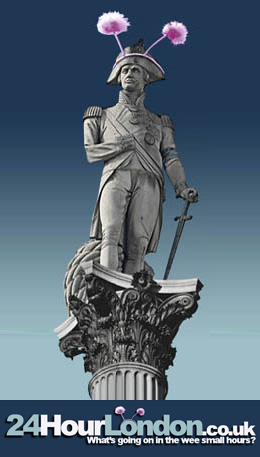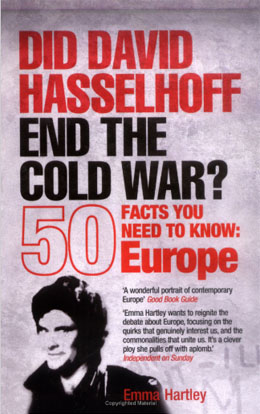Back in 2011, wondering why so many folkies seemed to find the folk awards so hard to like - though not me at the time - I asked who ran the awards? Specifically, I asked who the judges were and it turned out that their names were a secret.
So I put in a Freedom of Information request.
That was a waste of time.
The Information Commissioner denied my request because anything the BBC does, including an awards ceremony, is "journalism" as far as he is rather lazily concerned. I found this particularly irritating as I've been a journalist at UK national newspapers for over 15 years and the Information Commissioner had basically picked a large publicly funded but essentially inanimate body over me as the more significant "journalist" in this situation. That mechanism is broken and everyone involved in it should be ashamed of themselves.
In October 2012 something that looked like a breakthrough happened. I got a call from a BBC employee called Fergus Dudley, who I can say from experience only answers his phone calls and emails when his bosses tell him to, saying that the BBC Radio 2 folk awards would be flinging open the windows and allowing a little light in to proceedings. A little of the voting would be done by the public that year and there would be a special panel of people who would choose the winners of a couple of the awards, whose names would be known. He also hinted that there might very possibly be bigger changes on the horizon.
But that turned out to be untrue. Like a previous attempt to co-opt me by inviting me to join the 190-strong judging panel - all of whom are financially involved in the UK folk industry, it has emerged since 2011 - it was a ruse, spun in the hope that I would shut up.
That's not really me though.
Early last year I wrote a piece for the Spectator about why having a properly run folk awards is important. It's political: UK plc markets itself internationally as Downton Abbey, The King's Speech and Hugh floppy-haired Grant. But there is more to us than our ruling class.
There is a folk revival taking place on an unprecedented scale internationally, but the BBC folk awards is still apparently most interested in the one that took place in the 1970s and its definition of folk has not really moved on. Hence the ever-growing number of lifetime achievement awards it gives away.
But there is an entire industry of singer-songwriters playing traditional instruments, knowing some of the older songs, touring assiduously and yet struggling to make a living because the biggest marketing platform they have is used primarily as a force for promoting those who took part in the last folk revival and those who resemble them, rather than those working in its most recent incarnation. In these days in which television encourages the young to believe that musical success is handed out like sweeties by Simon Cowell and Tom Jones, the UK should instead be treasuring its hardworking, touring musicians who are keeping music live. Aren't the values involved in that important?
So towards the end of 2013 I wrote to John Whittingdale MP, chairman of the government's Culture, Media and Sport committee, asking whether it would be possible to look behind the curtain of secrecy and filch the list of the 190 judges names? Instead he received this waffly briefing.
Then Ben Bradshaw, Labour MP for Exeter and a member of the CMS committee who was recommended to me as being an "activist", had a go and received the same briefing as John Whittingdale, from a different person.
No list of judges was forthcoming. The BBC had closed ranks against its own parliamentary oversight committee.
Ben Bradshaw - apparently unshocked by this - put me in touch with Bob Shennan (above), the head of Radio 2, 6 Music and the BBC Asian Network directly. Mr Shennan responded to my letter to him - in the link above - like this.
It's very small lettering there, I know, though you can make it bigger by clicking on it. The first seven paragraphs are a repetition of sections of the waffly briefing paper delivered to the two MPs. The eighth, unrelatedly, says
"With these things in mind I believe that releasing the names of the judging panel would compromise the impartiality of the voting process."
This is the nub of the BBC's argument for not releasing the names: the names of the folk awards judges are a secret because making the information public would "compromise the impartiality of the voting process".
I wrote back.
Dear Mr Shennan.
Thanks for the message below. Could you be a bit more specific please about the ways in which "releasing the names of the judging panel would compromise the impartiality of the voting process"?
I look forward to receiving your reply.
Best wishes
Emma Hartley
Dear Miss Hartley,
I guess it is simply a question of lobbying and undue pressure being brought to bear on judges to support certain acts. That would be likely to effect (sic) the impartiality of the voting.
Best
Bob
Sent from my iPhone
I wrote back pointing out that the only way one can meaningfully lobby a music awards' judge is by playing them some music, unless they are corrupt. If the former is the case: what's the problem? Listening to music is what judging is all about. And if they are corrupt, get some new judges. Making the list of names public would help purge any corruption. I also quoted him some Jeremy Bentham and Woodrow Wilson on the subject of corruption and secrecy in public life. But he didn't seem to like that very much and the next thing I knew there was an email from Fergus Dudley...
Unless one is cynically assuming at this point that the folk awards are a way of lining the pockets of the judges - could this really be true? - it is almost inconceivable that the BBC would devote this much time and effort to concealing these names: the Freedom of Information act, the Culture, Media and Sport committee and several BBC executives have all given their expensive time to the issue now. What kind of a use is this of public money?
Unless one is cynically assuming at this point that the folk awards are a way of lining the pockets of the judges - could this really be true? - it is almost inconceivable that the BBC would devote this much time and effort to concealing these names: the Freedom of Information act, the Culture, Media and Sport committee and several BBC executives have all given their expensive time to the issue now. What kind of a use is this of public money?
Moreover, this kind of nonsense is an engine for making people cynical about the BBC.
To conclude, here is a word from Genevieve Tudor, that least cynical of BBC employees and one of the small number of folk awards judges whose names have been made public as a result of the changes two years ago. Genevieve is a BBC presenter of a folk show in Shropshire and surrounding counties and was involved in choosing the Best Original Song and Best Traditional Track winners this year and last. This is me instant chatting her on Facebook.
So I guess that's that argument disposed of... Folk awards judges whose names are public are not subject to undue pressure or lobbying of any kind. This was the reason given for keeping them secret: can I have the names of the folk awards judges now?
* If you'd like to receive posts from this blog directly into your Facebook newsfeed, you could *like* its Facebook page and then use the drop-down menu to indicate that it's one of your "interests". This will enhance the possibility that you'll get them. You could also follow me on Twitter at @emma1hartley
If anyone at the BBC or Smooth Operations would like to send me the judges' names you can contact me here.
Or if any of this strikes you as ridiculous, you can contact Bob Shennan in person at the BBC on bob.shennan@bbc.co.uk
* If you'd like to receive posts from this blog directly into your Facebook newsfeed, you could *like* its Facebook page and then use the drop-down menu to indicate that it's one of your "interests". This will enhance the possibility that you'll get them. You could also follow me on Twitter at @emma1hartley

















